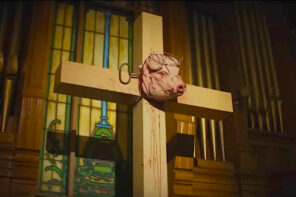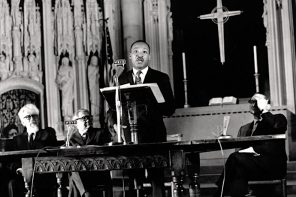We certainly don’t lack for things to worry about these days. Among many other concerns, the economic situation can only be described as grim:
Nevada resident Margaret Frye-Jackman, 71, was diagnosed in August with ovarian cancer. She had two rounds of chemotherapy at University Medical Center, the only public hospital in the Las Vegas area.
Soon after, she and her daughter heard the news on TV: The hospital’s outpatient oncology services were closing because of state Medicaid cuts. Treatment for Frye-Jackman and hundreds of other cancer patients was eliminated.
Luckily, Frye-Jackman’s gynecological oncologist, Dr. Nick Spirtos, decided to open a tiny chemotherapy center in his office’s empty storage room.
Today, he treats Frye-Jackman there, along with about 20 more cancer patients who were dumped by the hospital. Frye-Jackman’s care is paid for with Medicare and supplemental insurance, but other patients can’t cover the cost of full treatment. The doctor has considered putting donation boxes in the lobby.
“If this is what it’s like in Nevada, with cancer stuff closing, is it like that everywhere?” said Frye-Jackman’s daughter, Margaret Bakes, accompanying her mother to the doctor’s recently. “Are all the other states closing stuff too?”
As the article details, the answer to that question is essentially “yes.”
The dire news comes as no surprise to anyone who’s opened a newspaper recently: jobs are vanishing, the banking system is teetering on the precipice, the auto industry may be beyond redemption, and even the recently-passed stimulus package might not put things right. In my own little church of about 125 members, we have two people who have been laid off, at least three whose hours have been cut to part-time, and who knows how many more who worry about job security or how they will pay for health insurance.
In the midst of this misery, I believe it is incumbent on religious believers to articulate a word of hope. That is a special duty of progressive believers; conservative responses to the daily news run mostly to cynicism, despair, and waiting for the Lord to return in his glory to judge our failures. And if belief is to provide any kind of witness to our diverse society, it must be able to articulate a meaningful alternative to what we see all around us.
In a sense, I am advocating that progressive believers reclaim “hope” as a theological category. First we will have to wrest the concept away from our current president, who has been described as a “a walking, talking, hope machine.”
Obama seems to understand at least some of the imperative of hope. He knows that it binds us together. In fact, he framed his inaugural address around the idea, opening and closing with mentions of communal hope:
On this day, we gather because we have chosen hope over fear, unity of purpose over conflict and discord.
…
At a moment when the outcome of our revolution was most in doubt, the father of our nation ordered these words be read to the people:
“Let it be told to the future world … that in the depth of winter, when nothing but hope and virtue could survive…that the city and the country, alarmed at one common danger, came forth to meet [it].”
America, in the face of our common dangers, in this winter of our hardship, let us remember these timeless words. With hope and virtue, let us brave once more the icy currents, and endure what storms may come. Let it be said by our children’s children that when we were tested we refused to let this journey end, that we did not turn back nor did we falter; and with eyes fixed on the horizon and God’s grace upon us, we carried forth that great gift of freedom and delivered it safely to future generations.
This is rich stuff, reminiscent of biblical narratives from Exodus and the Epistle to the Hebrews. Obama knows that hope is a moral category, and as such, is deeply intertwined with communal life. The psychologist Jonathan Haidt says:
Morality is not just about how we treat each other [as most liberals think]; it is also about binding groups together, supporting essential institutions, and living in a sanctified and noble way.
Obama understands that, and his political genius rests in his ability to summon Americans to common purpose, a calling we have been sorely lacking since our nation entered Nixonland four decades ago.
For the most part, though, Obama’s understanding of the content of hope is curiously limited. He sees it as redemptive of unfulfilled promises, for example, but he carefully limits the source of those promises to the social contract citizens make with one another. And while he entertains the idea of creative dissatisfaction, he glosses over hope’s liberative aspect, never quite endorsing its disruptive edge. In his primary victory speech in Iowa, he said:
But we always knew that hope is not blind optimism. It’s not ignoring the enormity of the task ahead or the roadblocks that stand in our path. It’s not sitting on the sidelines or shrinking from a fight. Hope is that thing inside us that insists, despite all evidence to the contrary, that something better awaits us if we have the courage to reach for it, and work for it, and fight for it.
Hope is what I saw in the eyes of the young woman in Cedar Rapids who works the night shift after a full day of college and still can’t afford health care for a sister who’s ill; a young woman who still believes that this country will give her the chance to live out her dreams.
Hope is what I heard in the voice of the New Hampshire woman who told me that she hasn’t been able to breathe since her nephew left for Iraq; who still goes to bed each night praying for a safe return.
Hope is what led a band of colonists to rise up against an Empire; what led the greatest of generations to free a continent and heal a nation; what led young men and women to sit at lunch counters and brave fire hoses and march through Selma and Montgomery for freedom’s cause.
Hope is what led me here today—with a father from Kenya; a mother from Kansas; and a story that could only happen in the United States of America. It is the bedrock of this nation; the belief that our destiny will not be written for us, but by us; by all those men and women who are not content to settle for the world as it is; who have the courage to remake the world as it should be.
All of which sounds wonderful—and it is. But it rests on the foundation of fixing what already exists, not imagining a new way altogether. In a moment of great crisis, prudential engineering may not be enough. We may need to go back to the drawing board, as it were.
Along the same lines, Obama forgets—or neglects—that the Civil Rights movement not only called on America to live up to its constitutional promises of equality; it called on American citizens to enter into a new way of relating to one another. It did so with a constant impatience with the way things were—a relentless, increasingly radical unwillingness to accept the status quo that would quite disturb Obama the bipartisan peacemaker.
Obama’s vision of hope is also rooted in an evangelical understanding of human effort, a framework he may have inherited from Jeremiah Wright. Unfortunately, it does not exactly accord with scriptural witness. In the Bible, God alone is the source of hope, and draws the people to it like a gravitational pull. Biblical hope has less to do with the determination of those experiencing it than with God’s ultimate intentions for them.
These may seem like minor points. After all, we are talking about the President of the United States, not our Theologian-in-Chief. Obama’s rhetoric is aimed where it should be. He wants to motivate citizens around a particular vision of what government is and can be. The rest, despite Obama’s occasional nod to changing the culture, is so much political adiaphora.
But somebody needs to say these things. It seems to me—admittedly unscientifically—that people want to hear not that things can be better, but that they can be different. What this latest economic crisis finally and undeniably reveals is that the deck has been stacked against the little guy for many years. We cannot keep going this way. An authentic word of hope for today, then, must be transformational. It must recognize that we will never be the same for having experienced this shock, so we might as well come out of it better people, more tightly knit. Obama is only able to articulate that vision fleetingly. He needs somebody to push him into it.
He needs, in other words, to be pushed into confrontation with what theology of hope proponent Jurgen Moltmann calls the “human securities, empires, and contrived absolutes” that got us into this mess. Obama and the principalities and powers need to be brought before a vision of God and her intentions for all of us and made to face the shortcomings of the way things must be.
For what goes unstated in Obama’s vision of hope, indeed in all the visions of hope that spill from the mouths of politicians, is the shocking, unsettling idea that perhaps we can’t. Not alone, anyway. The things we hope for the most in our lives—our health, our wealth, our security, our happiness—cannot always be reached or worked or fought for. They are the gifts of a good and gracious God. And hope—real, honest, gritty hope—consists not in the Pollyannish belief that these things can be realized if only we try hard enough, but in the hard-nosed assertion that God purposes them for the good of all people. Hope results in the immoderate belief that any and all barriers to the realization of that purpose must be torn down now. Moreover, it results in the troubling assertion that our end goal is to do the tearing down.
This is a very different version of hope than the one President Obama articulates. It’s bound to be unpopular if taken seriously. But like I said, we have plenty of other things to worry about these days. Hope, finally, is also the quiet assurance that God always gets what she wants in the end. What economic downturn can stand against that?




